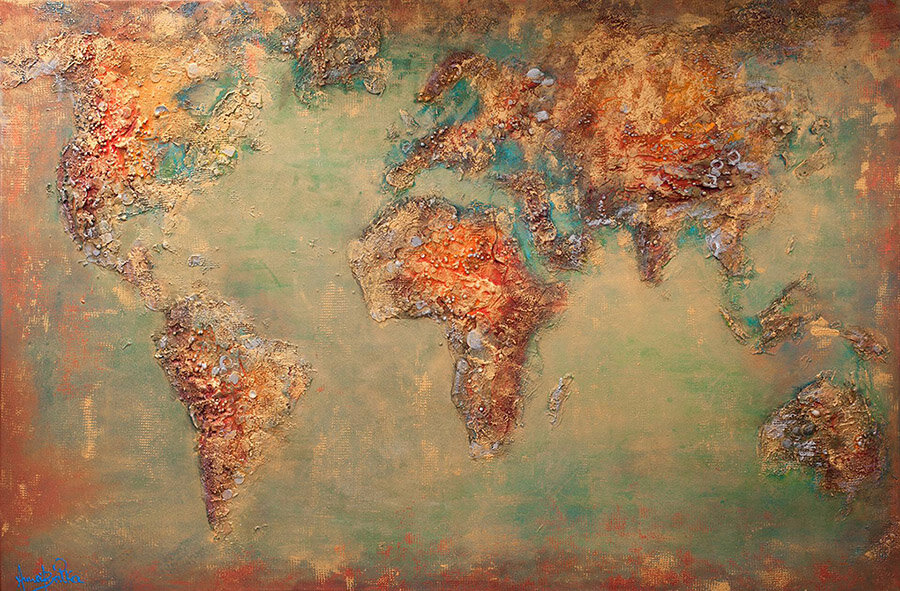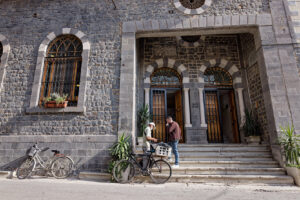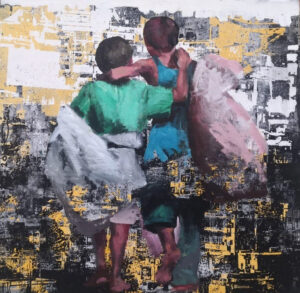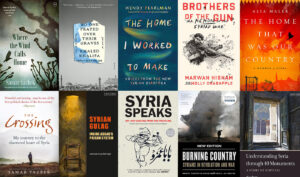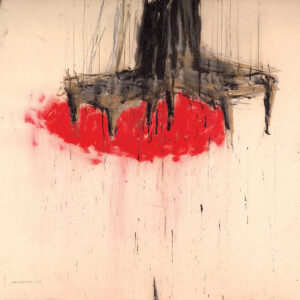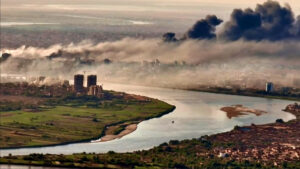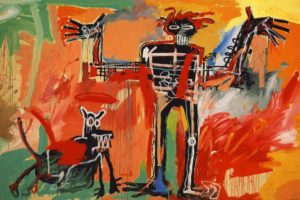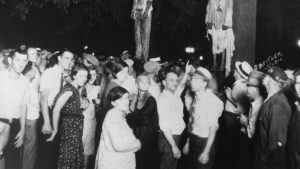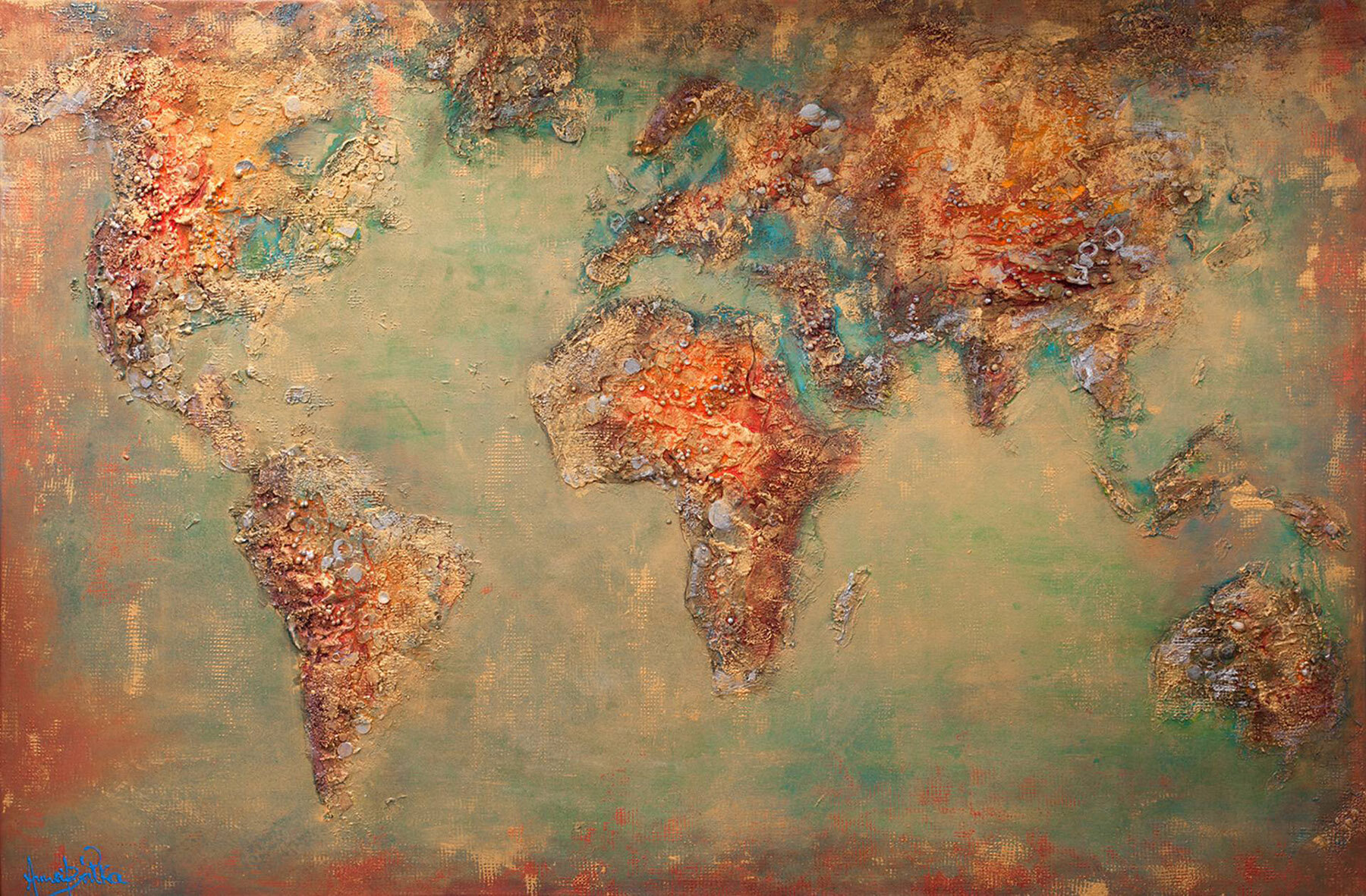
World map, textured acrylic abstract by artist Anna Marija Bulka (courtesy Saatchi Art)
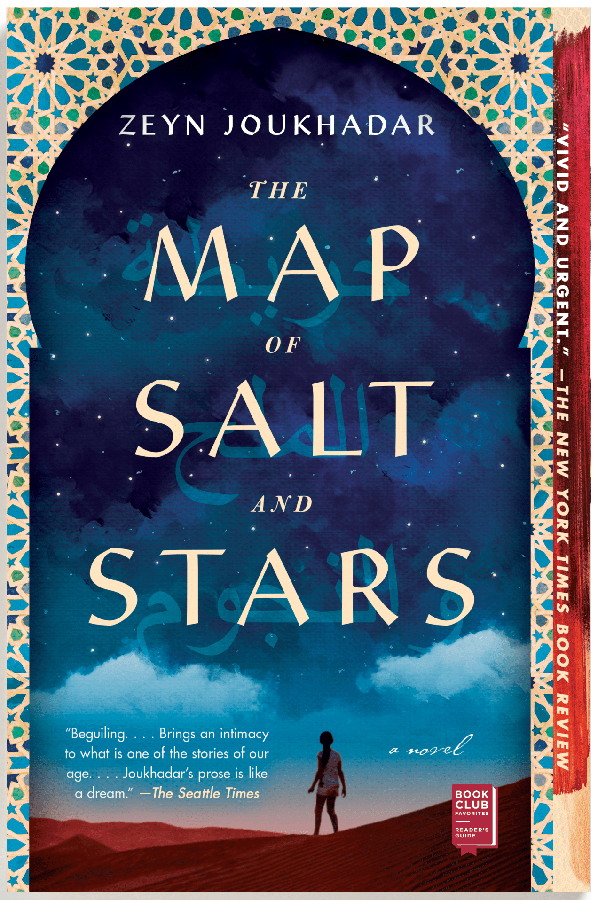
The Map of Salt and Stars is available from Touchstone.
Roundabout of Death, a novel by Faysal Khartash,
Translated from the Arabic by Max Weiss
New Vessel Press (New York, May 2021)
ISBN 9781939931924
The Map of Salt and Stars, a novel by Zeyn Joukhadar
Simon & Schuster/Touchstone Press (New York, 2018)
ISBN 9781501169052
Rana Asfour
In an article entitled “On Literary Cartography: Narrative as a Spatially Symbolic Act“, Robert Tally wrote that “The human condition is one of being ‘at sea’ — both launched into the world and somewhat lost in it — and, like the navigator, we employ maps, logs, our own observations and imagination to make sense of our place.”
At present, with conflicts in the Middle East continuing to remap the geography and redefine — if not eradicate — points of reference, war stories have become ever more socially and politically relevant, carrying a huge emotional resonance with characters that are often dealing with loss: a parent, a sibling, a friend, or something not flesh-and-blood but nonetheless monumental, like home, or their past. When such writers map their world, they create a space that allows readers to engage in a manner that makes better sense navigating a changing world defined by loss and the absence of the familiar.
Peter Turchi argues in his book Maps of the Imagination: The Writer as Cartographer that all writers are mapmakers and that all writing is like a map. “…[L]anguage is like a land, paragraphs are districts, sentences are streets, and words are only lines and curves constructed the way maps are made of lines and shapes,” he observes.
That said, it is not only all of the above that the two novels reviewed below, Roundabout of Death by Faysal Khartash and The Map of Salt and Stars by Zeyn Joukhadar, have in common, but they each challenge readers to broaden the traditional definition of ‘map’ to one transformed through literary cartography in which veins in bloodshot eyes are a roadmap of fear, hearts and tongues, words and language are guides to home.
The Map of Salt and Stars is an epic novel which deftly weaves together past and the present to create a compelling coming-of-age story of two heroines facing perilous times. In the summer of 2011, in New York, three American sisters, Huda, Zahra, and Nour lose their father to cancer. In a bid to be closer to her family, their mother — a cartographer — decides to move them all back to “hot and rainless” Homs, in Syria, heedless of the unrest bubbling across the country where she hopes to be able to sell her maps. They arrive in a country with sporadic electricity cuts, protests, and distant shelling. A city once bustling with people is now a ghostville with pavements rendered almost empty of people.
To cope with her grief, Nour, the youngest of the sisters and the closest to their late father, becomes obsessed with one of his bedtime stories about Rawiya, a fatherless 12th-century adventurer from Ceuta, who at sixteen disguised herself as a boy to seek her fortune to save her mother from starvation. She joined the caravanserai of Muslim scholar and geographer Abu Abd Allah Muhammad Al-Idrissi on his quest to create the Nuzhat al-mushtāq fī ikhtirāq al-āfāq, known in the West as the Tabula Rogeriana, a book that Idrissi worked on for fifteen years at the court of the Norman King Roger II of Sicily, who commissioned the work around 1138. Written in Arabic, and divided into seven climate zones, each of which is sub-divided into ten sections, the book contains maps showing the Eurasian continent in its entirety, but only the northern part of the African continent. The map is oriented with the North at the bottom and the text incorporates exhaustive descriptions of the physical, cultural, political and socioeconomic conditions of each region; each of the 70 sections has a corresponding map.
Back in Homs, Nour struggles to adjust to her new surroundings, in part due to her limited knowledge of Arabic that “fills the air like a flock of startled birds.” Also, Nour has synesthesia, a neurological condition that affects her reactions and allows her to experience the world in a different way than those around her. It is in these passages that the author’s figurative language bursts resplendent. For Nour, Manhattan horse chestnut trees bloomed “white like the fat grains of rock salt under the apartment window in spring,” and in the family’s tree roots in Homs she tastes “purple air and oil.” When the shrapnel appears it is “a red word that sounds like metal and anger and being in the wrong place at the wrong time. It sounds like the red and yellow things inside of people. The fear and rage that rot a person out until they rot out somebody else.” The voices of boys jostling each other in the neighbourhood’s clock tower are “chalk and chocolate,” the aftermath of a blast “a plume of gray dust like ink in a glass of water” in which the shouting “bleats and pounds like angry music” and “black sounds roll like marbles in the throat.”
After a stray shell demolishes the family home and Huda is seriously injured, the family members quickly pack what they can carry of their belongings into a family friend’s car and head out, first to Damascus for medical assistance for Huda and then to the American embassy, located in neighboring country Jordan. However, complications arise and it is soon apparent that in order to find safety the family will have to travel across seven countries of the Middle East and North Africa — along the very route Rawiya and the mapmaker took 800 years before. For Nour though, it is her mother’s personal map inlaid with a secret color-coding system and cached family history in the form of poems, which “map the soul in the guise of words,” that will guide her to safety when the family is forced to separate.
Joukhadar’s choice to juxtapose the experiences of his two female characters Rawiya and Nour is ingenious not only in showing the historic discrimination, dismissal and violence young women had and continue to have to deal with, in societies needing them to conform, but they are also stories of two young women mapping out their place in the world and where and how they will ever fit in to it when all that they have ever learned of home and safety is snatched away and they are left to question whether “the world is nothing more than a collection of senseless hurts waiting to happen, one long cut waiting to bleed,” and that eventually it is not death that hurts, but living.
The Map of Salt and Stars, is being translated into twenty languages, and was a 2018 Middle East Book Award winner in Youth Literature. The author who identifies as Zeyn Joukhadar released his latest novel The Thirty Names of Night (Atria/Simon & Schuster, 2020) which won the 2021 Barbara Gittings Stonewall Book Award, was a 2021 Lambda Literary Awards finalist in Transgender Fiction, and was a December 2020 Indie Next Book Pick.
Joukhadar is a member of the Radius of Arab American Writers (RAWI) whose work has appeared in KINK: Stories (eds. RO Kwon & Garth Greenwell), Salon, The Paris Review, Shondaland, [PANK], Mizna, and elsewhere, and has been nominated for the Pushcart Prize and the Best of the Net. He is also the guest editor of the 2020 Queer + Trans Voices issue of Mizna and a Periplus Collective mentor.
— • —
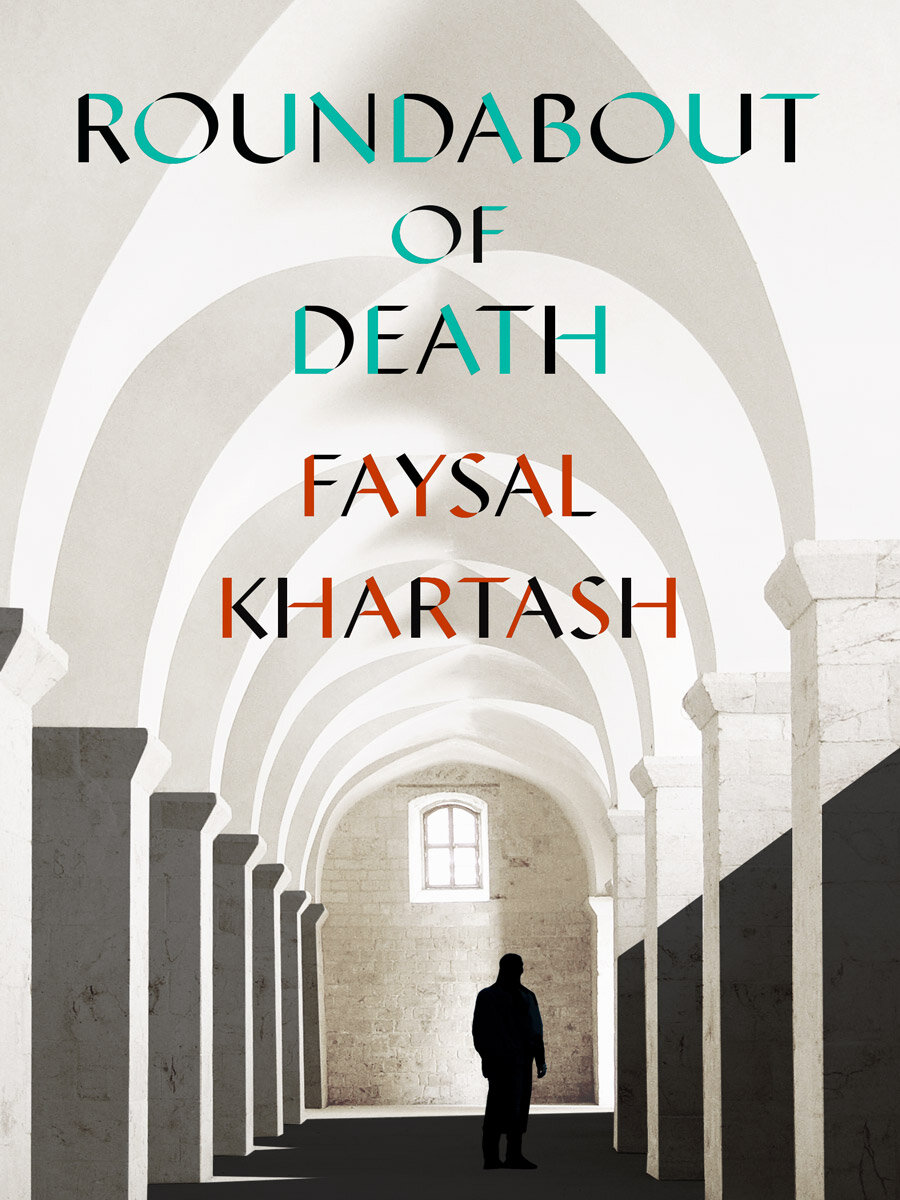
Roundabout of Death is available from New Vessel Press.
First published in Arabic in 2017 as Dawwār al-mawt mā bayna Halab wa-l-Raqqa, Faysal Khartash’s Roundabout of Death is the first of his novels to be translated into English, despite an extensive bibliography of work in Arabic. Khartash, who was born in 1952 and still lives in Aleppo, is considered part of a generation of disillusioned Syrian writers who were relatively isolated from the rest of their country and little known outside of it who, as his translator Max Weiss notes, “nevertheless continued to live, write and work languishing away for many of their days in dingy, smoke-filled cafes, bars, and restaurants, under the alternatively lazy and watchful eye of state censorship.”
Like the author, the novel’s protagonist Jumaa Abd Al Jaleel lives in Aleppo. In 2012, the war has arrived in fury to the city once accorded the protected status of a UNESCO World Heritage Site. Jumaa, a high school teacher of Arabic, is now jobless and forced to live under horrific conditions in which running daily errands has become a life-threatening task. Readers meet Jumaa on the morning he has woken up to discover that his head, which had always been round, has turned egg-shaped “with two tiny bumps bulging out in arousal,” making him “appear as some kind of sexual deviant.” This, however, mirrors the confusion of chaos that surrounds him, and he is unsure as to how or why these bumps have appeared or if they’re even real.
From the moment in which Jumaa makes up his mind to ignore his condition and instead to set about his daily routine starting at the Joha Café overlooking the Saadallah al-Jabiri Square, readers are confronted with a hellish tour of the city’s warscape as Jumaa later navigates the city on bus, on foot, and in car especially when he struggles to reach his mother’s house on the Eastern side of the city, which is controlled by the Free Syrian Army. Throughout it all, Jumaa notes the ever increasing number of checkpoints and the geographical remapping taking place on a near daily basis. Readers would do well to make a list of the actual names of places and monuments mentioned in the novel. Some, like the university building now houses refugees and the internally displaced, schools are converted to storehouses for airplane parts and projectiles, and yet others have been completely “wiped off the map of Aleppo,” forever lost, as a result of the incessant dropping of five hundred kilogram bombs from regime fighter jets circling the sky and the pounding bombardment of attacks and counterattacks of militias heavily armed with Russian artillery from the ground that have obliterated historical landmarks, causing the city’s sewers and water mains to flood, razing houses, shops, mosques, eventually leaving “whoever is left alive to wait for the next round of shelling, a role created for them … until the pilot completes his mission and returns safely back to base, washes his hands, runs off to scarf down his meal and head to sleep because it’s well past his bedtime.”
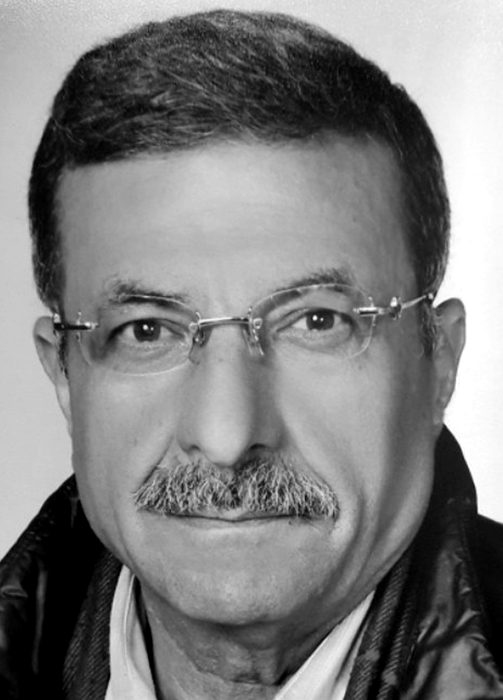
Syrian novelist Faysal Khartash
Although not much happens in terms of plot in the novel, the writing is gut- wrenching and insightful. “People cannot find bread to eat,” Jumaa laments at one point, “in a country covered with wheat.” Although Roundabout is concentrated on the fighting and the treacherous conditions within Aleppo, other cities like Raqqa, under ISIS control, are mentioned when Jumaa, egged on by his wife, scouts it out as a possible safer place to live after his son’s arrest, torture and eventual release by regime forces. However, Jumaa soon changes his mind when on this visit, he observes Tunisian, Libyan and Moroccan militiamen humiliating people, Mujahids looting shops after a market blast, women wrapped up tight in their clothes with only their eyes visible, threatened with the whip if they transgress, and when he eventually runs into a French filmmaker he once met in Paris, now turned “to Jihad in the path of God” and living in Raqqa after making his way into Syria through Turkey awaiting orders to carry out a jihadi operation, he knows that this is not the place for him. And so Jumaa returns to Aleppo, and to yet another bit of devastating news. His cousin Fatima is shot by regime forces from the minaret of the mosque where his mother used to say prayers and blessings for her children. His Palestinian friend’s son is experiencing “extreme phobias” that the doctor has diagnosed as “completely normal” But, at least his son Nawwar has crossed successfully into Istanbul — he is safe but it remains to be seen whether Jumaa will survive the war to ever see his son again. Roundabout of Death is a sweeping tale of war and the obliteration of a city, but it is also one that maps absence, grief and loss.
By the middle of December 2016, Bashar Al-Assad’s government forces announced that they had allegedly defeated the rebels in Aleppo and taken back control of the city that lay completely flattened, with hundreds of thousands of people internally displaced and many more becoming refugees. “Whatever the case,” writes translator Max Weiss in his introduction, “it is a cruel irony of history that the jaw-dropping and awe-inspiring city of Aleppo now seems to be inscribed in global consciousness at the moment of its annihilation…Roundabout of Death can be read as a monumental testament to the power of literature as a means of documenting wartime atrocities, but one should not neglect to appreciate how such a literary text can also more modestly capture moments of psychological vulnerability, physical danger, and geographical remapping.”



